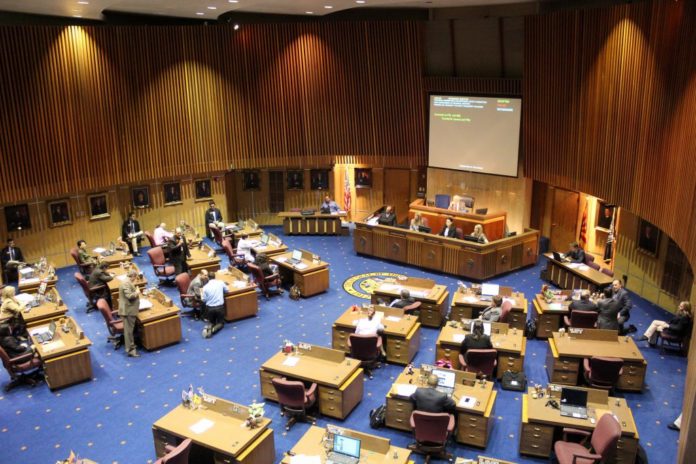Arizona House Democrats refused to show up at the Capitol on Tuesday, blocking debate on a budget and a major tax cut primarily benefitting the wealthy.
But the Senate plowed ahead and was on track to pass the budget plan, advancing many of the 11 bills toward final votes expected as soon as late Tuesday. They also unveiled a raft of new policy changes that include a massive expansion of the state’s private school voucher program.
Both chambers are controlled by Republicans, and Democrats could not block Senate action.
The Senate amendments to the budget also ban so-called “critical race theory,” ban K-12 schools and universities from requiring COVID-19 vaccines, prevent both from requiring face masks if the coronavirus pandemic surges again and bar any employer or business from requiring vaccine passports.
All were priorities of majority Republicans but had not passed as standalone bills or were new issues. That was the case with facemasks at universities, where Gov. Doug Ducey last week issued an order barring Arizona State University from implementing a new policy that said unvaccinated students must be regularly tested and wear face masks.
Democrats vehemently oppose a $1.9 billion-per-year tax cut in the budget negotiated by Ducey and top leaders of the House and Senate, all Republicans. The plan would lower tax rates for most taxpayers to 2.5%, down from a range of 2.59% to 4.5%. Wealthy taxpayers would, in effect, be spared from a 3.5% tax hike approved by voters last year to pay for schools.
Changes to get Republican votes slightly slow the phase-in of the tax cuts to ensure revenue projections are met.
Republicans say the tax cuts would boost the economy and keep Arizona’s tax rates competitive. Democrats say it would starve public services, including education.
“For many of us, we see this for what it is – it’s just a tax cut for the wealthy,” said Sen. Rebecca Rios, the minority leader. “The top 1% of Arizona wage earners are going to reap 50% of the tax cut benefits. The bottom 80% of working families will get on 7 % of the benefits. This is welfare for the wealthy.”
Senate Republicans mainly stayed silent during debate, knowing they had the votes to pass the budget. They rejected a series of Democratic amendments on 16-14 party-line votes.
The move by House Democrats, meanwhile, kept the lower chamber short of the number of lawmakers required to conduct business, forcing Republican House leaders to delay budget work until Thursday, when all GOP lawmakers are expected to be at the Capitol.
House Democratic Leader Reginald Bolding said Democrats and the public need more time to review proposed changes Republicans released shortly before the budget debate was scheduled to begin.
“You can’t simultaneously ignore the wishes of half the state and then take us for granted to pass a partisan budget,” Bolding said in a statement.
Denying a quorum is a tactic increasingly being weaponized by the minority parties of state legislatures in an era of intense partisanship. Republicans in the Democratic-controlled Oregon Senate have blocked legislation for years by refusing to show up, denying the two-thirds quorum required there. Democrats in the Republican-controlled Texas House blocked an elections bill this year by walking out.
That hasn’t previously been an issue in Arizona, where a quorum requires the presence of only a simple majority of lawmakers. But on Tuesday, several Republicans planned to vote remotely under rules created during the pandemic, allowing Democrats to exploit the absences.
The move left Republicans fuming.
“I would ask us all, it may really be tough, but could we contemplate growing up and shouldering the responsibility together and think of together more than individual and pass a budget?” Rusty Bowers said before the House adjourned. “We’re gonna try again on Thursday.”
The budget plan stalled for weeks amid concerns among a handful of Republicans that it would cripple city governments, which get a big share of their revenue from the state income tax. Ducey and legislative leaders ameliorated the GOP concerns by agreeing to delay the implementation of the tax cut and give local governments a bigger share of income tax collections.
Democrats also oppose many other budget provisions, including plans to strip Democratic Secretary of State Katie Hobbs of her power to defend election lawsuits and limits on vaccine and masking requirements for universities and local governments.
They also vehemently opposed the revival of the expanded school voucher program, which had stalled in the House for months. That measure would qualify another 600,000 of Arizona’s 1.1 million K-12 students for the program, allowing students who qualify for free or reduced price lunch to get vouchers.
Republicans have called the measure a lifeline for low-income students, while Democrats argue it would siphon money from already-underfunded public schools and go against the will of voters who rejected a larger expansion in 2018.
“I have always been against … vouchers for education because they really, really hurt district schools,” Democratic Sen. Sally Ann Gonzales said. “They take money away from district schools.”
The proposal was championed by Republican Sen. Paul Boyer, one of two Republicans who held up the budget for weeks, in part over concerns cities would be hurt by the tax cuts.
Republished with the permission of the Associated Press.














